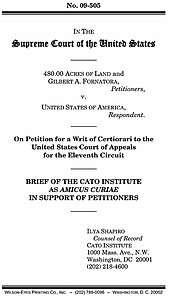Learn more about Cato’s Amicus Briefs Program.
In federal eminent domain cases, the “scope of the project” rule requires that in determining “just compensation” under the Fifth Amendment’s Takings Clause, any increase or decrease in property value caused by the federal project be disregarded. Here, the federal government had discussed the idea of expanding Everglades National Park for over 30 years, and also induced the local government to enact tougher zoning standards that decreased the value of the property that was to be taken for this purpose. These federal actions forced Gilbert Fornatora to watch the value of his South Florida property decline until the federal government finally condemned it—and paid him much lower compensation than he would otherwise have received. Then, once condemnation proceedings began, the government manipulated the hearing schedule by front-loading ill-prepared owners who lacked counsel, thereby setting a low valuation precedent that would then be applied to the later parties with representation, like Fornatora. The Eleventh Circuit sided with the government, so Fornatora petitioned the Supreme Court to review the case. Cato filed an amicus brief supporting this petition, arguing that property owners have virtually no “scope of the project” protection if they must prove that the government’s sole or primary purpose for pre-condemnation action was to depress property values for later eminent domain proceedings. A more workable test, consistent with due process, is merely to require evidence of a nexus between the government’s actions and the depressed property value. The Court should also hear this case to ensure that just compensation proceedings comport with the due process, equal protection, and general fairness standards the government is required to follow in a variety of other settings.

This work is licensed under a Creative Commons Attribution-NonCommercial-ShareAlike 4.0 International License.

